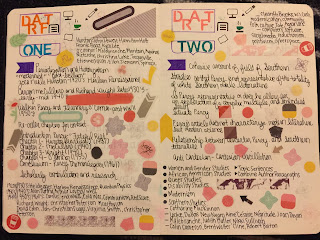I’m an idealistic and ambitious person, and as graduate students, I bet you are too. This means inevitably I become excited thinking about the end of the semester and how much work I’m going to get done over the winter or summer break. When break is over it always feels I’ve gotten very little accomplished and am completely unfocused when the new semester begins again. It also means, I underestimate the time it will take me to complete anything.
First, especially if you don’t live in the state where you’re going to school, get out of town, enjoy new scenery, and see friends and family. If going home is restorative and inexpensive, do it! If not, go somewhere else that is.
Second, when planning be flexible and realistic. We all want to take advantage of the time to get ahead, because we’re always short on time, but you will not finish three dissertation chapters over winter break or finish a thesis over summer break, so set manageable, achievable goals for each day, each week, and each month and record them. You won’t feel you didn’t accomplish much if you are able to track your progress over break in this way. Pro tip: baking cookies totally counts as research.
Assess the semester ahead: Where are you in your academic career and where do you want to/need to be in the upcoming semester? Breaks are a wonderful time to work on those essential tasks every academic must complete on top of course work. Whether it’s more coursework, the job market, or somewhere in between, look forward to the next semester, the next year and utilize the time to best benefit and prepare yourself for the next stage to avoid, at least a tiny bit, that constant feeling of never being caught up. If you’re still in the coursework stage, begin reading for the next semester. Syllabi are already available.
If you’re past the coursework stage, focus only continuing to prepare for field exams or comprehensive exams. If you’re in the dissertation or thesis stage, let your chair enjoy their holiday and work on sections of chapters. Maybe you’ve put off the literature review during the semester because of you’re teaching assistant or graduate assistant duties because it’s the most challenging section for you to get through writing. Use break time to devote your complete focus to it. If you’re nearing graduation, don’t check out mentally quite yet. Use the time to apply for PhD programs or assistant professor positions/post docs.
At any stage in your academic career you can use break time to polish an article to send off to prospective journals for publication. You can also begin to think about summer employment opportunities during winter break instead of scrambling for a way to make some income when May finally arrives. Apply for internships and travel grants during break as a way to think ahead financially and to facilitate future projects which will benefit your thesis/dissertation research. Applying to conferences and attending conferences during break is another great use of time. Both of us in the Thesis/Dissertation Office will be headed to MLA over break. Prioritize whatever use of your time will benefit you the most.
Reflect on the past semester: Though you may be happy to put the semester behind you and are looking forward to the semester ending, take time to reflect on how the semester went for you professionally, academically, and personally. What could you have done to be more successful as a graduate student? More importantly, what did you accomplish and what did you do that proved to be very successful? This is just as important in terms of preparing for the next semester as looking over the syllabus. Making time for family and friends over break is even more tough than it usually is during the semester, but it’s equally as important as preparing for the next semester, so be sure to prioritize.















































